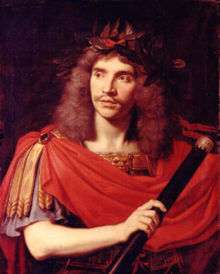Molière

Molière
Molière was born in 1622 as Jean-Baptiste Poquelin, one of the many children of the French royal tapestry-maker. He tried to follow his father's footsteps and later, to become a lawyer, but his heart wasn't in it, and he ended up as one of the greatest French playwrights, and a protégé of King Louis XIV.
Legend has it he died on the stage, in 1673, playing the main role in The Imaginary Invalid.[1]
Heavily influenced by Commedia Dell'Arte, his plays are full of slapstick, misunderstandings, and thwarted lovers.
Among his works are:
- The Flying Doctor (Le Médecin volant)
- The Blunderer, or The Dust-Up (L'Étourdi, ou Le Contretemps)
- The Doctor in Love (Le Docteur amoureux)
- The Affected Young Ladies (Les Précieuses ridicules)
- Sganarelle, or the Imaginary Cuckold (Sganarelle, ou Le Cocu imaginaire)
- Don Garcia of Navarre, or the Jealous Prince (Dom Garcie de Navarre, ou Le Prince jaloux)
- The School for Husbands (L'École des maris)
- The Mad (Les Fâcheux)
- The School for Wives (L'École des femmes)
- Critique of the School for Wives (La Critique de l'école des femmes)
- The Forced Marriage (Le Mariage forcé)
- The Princess of Elid (La Princesse d'Élide)
- Tartuffe, or The Hypocrite (Tartuffe, ou L'Imposteur)
- Don Juan, or The Stone Guest (Dom Juan, ou Le Festin de pierre)
- Doctor Love (L'Amour médecin)
- The Misanthrope, or The Malcontent in Love (Le Misanthrope, ou L'Atrabilaire amoureux)
- The Doctor in Spite of Himself (Le Médecin malgré lui)
- Mélicerte
- The Sicilian, or Love the Artist (Le Sicilien, ou L'Amour peintre)
- Amphitryon
- George Dandin, or the Husband Abashed (George Dandin, ou Le Mari confondu)
- The Miser, or The School for Lying (L'Avare, ou L'École du mensonge)
- Monsieur de Pourceaugnac
- The Magnificent Lovers (Les Amants magnifiques)
- The Bourgeois Gentleman (Le Bourgeois gentilhomme)
- Psyche
- The Pranks of Scapin (Les Fourberies de Scapin)
- The Countess of Escarbagnas (La Comtesse d'Escarbagnas)
- The Learned Ladies (Les Femmes savantes)
- The Hypochodriac (Le Malade imaginaire)
Works by Molière with their own trope pages:
Molière provides examples of the following tropes:
- Arranged Marriage: Always thwarted by the lovers.
- Author Tract
- Catch Phrase: One of Molière's favourite source of comedy involves a character repeating the same line over and over again in one scene. In some cases they became proverbial (e.g., "What the devil was he doing on that galley?" (« Que diable allait-il faire dans cette galère? ») from Les Fourberies de Scapin, and "Poor man!" (« Le pauvre homme! ») from Tartuffe)
- French Maid: The soubrette found in several of his plays; Dorine in Tartuffe is perhaps the clearest example.
- Grande Dame: Mme. Pernelle; Arsinoé has some affinities with the type.
- Long Lost Sibling
- May-December Romance: Subverted, in that it's usually young girls who want nothing to do with the old men who are being forced on them.
- Orphan's Plot Trinket: In Les Fourberies de Scapin, Zerbine's bracelet.
- Rhymes on a Dime: Much of Molière's dialogue rhymes, as per the conventions of his day.
- The Scrooge: Harpagon from The Miser.
- Servile Snarker: There's one in every one of his plays.
- Straw Hypocrite: Tartuffe
- ↑ In fact, he collapsed on stage, was taken home and died there a few hours later.
This article is issued from Allthetropes. The text is licensed under Creative Commons - Attribution - Sharealike. Additional terms may apply for the media files.